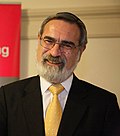It has been suggested that this article be merged into Chief Rabbi of the United Hebrew Congregations of the Commonwealth . (Discuss) Proposed since August 2025. |
The following list of chief rabbis of the United Hebrew Congregations of the Commonwealth gives information regarding the Chief Rabbi of the United Synagogue, which is represented through the mainstream majority Orthodox community of the United Kingdom (as the oldest and original denomination), and various other Orthodox communities located within the Commonwealth of Nations. The Chief Rabbi's full title is the "Chief Rabbi of the United Hebrew Congregations of the Commonwealth", previously "... of the British Empire". His title and position has historically, since 1758, been considered to be the Orthodox Jewish community in Britain's equivalent of the Archbishop of Canterbury. [1]











